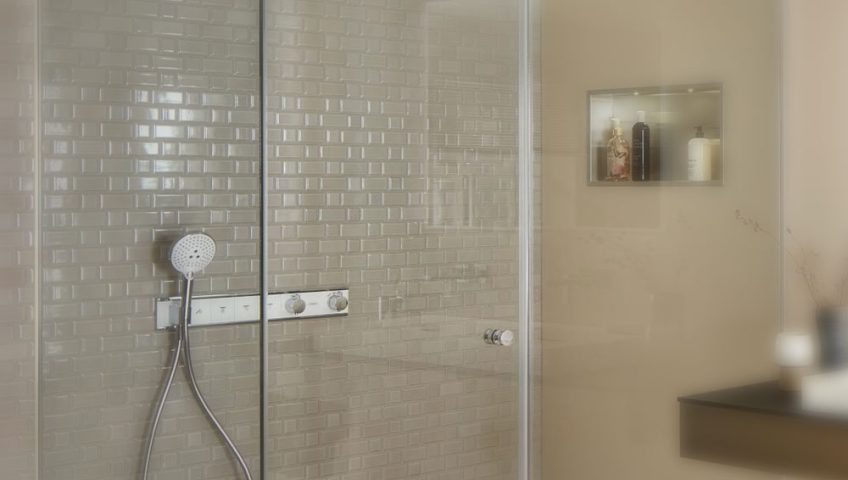Water leaks in the shower can be a major concern for property owners, as they can lead to costly repairs and structural damage. As a professional commercial builder and renovator, I’ve encountered numerous cases of water leaks in showers, and have compiled a list of the 10 most common causes. In this article, I’ll discuss each cause in detail and provide practical solutions for fixing them without having to renovate the entire bathroom. As a property maintenance service provider, my goal is to help you save time, money, and frustration by addressing these issues promptly and effectively.
1. Worn-out or damaged grout
Grout is a porous material that seals the gaps between your shower tiles. Over time, it can become cracked, chipped, or worn away due to constant exposure to water and cleaning agents. When this occurs, water can seep through the gaps and cause leaks.
Fix: Remove any loose or damaged grout using a grout removal tool. Thoroughly clean the area and apply a fresh layer of grout. Allow it to dry completely before using the shower.
2. Deteriorated or missing caulk
Caulk is a waterproof sealant applied to the edges of your shower, particularly around the base, corners, and where the tiles meet the shower fixtures. Like grout, caulk can degrade over time, leading to water penetration and leaks.
Fix: Scrape away any old, damaged, or missing caulk using a caulk removal tool. Clean the surface thoroughly, and apply a new bead of high-quality silicone caulk. Allow the caulk to cure for at least 24 hours before using the shower.
3. Damaged or loose tiles
Cracked or loose tiles can allow water to seep through, leading to leaks in your shower. This issue is often caused by structural movement, water damage, or improper installation.
Fix: If the damage is limited to a few tiles, remove and replace them with new ones that match your existing tiles. Ensure the new tiles are installed correctly and sealed with grout.
4. Faulty shower door or curtain
A poorly fitted shower door or curtain can allow water to escape the shower area and cause leaks. This issue is commonly caused by improper installation, worn-out seals, or damage to the door or curtain.
Fix: If the shower door is misaligned, adjust the door hinges or rollers to achieve a proper seal. Replace any worn-out or damaged seals, and repair or replace the shower curtain if necessary.
5. Leaking showerhead or faucet
A leaky showerhead or faucet is not only annoying but can also lead to water damage if left unaddressed. These leaks typically result from worn-out or damaged washers, gaskets, or O-rings.
Fix: Disassemble the showerhead or faucet, and inspect the internal components for wear or damage. Replace any faulty parts and reassemble the fixture, ensuring a snug fit.
6. Damaged shower pan or tray
Shower pans and trays are designed to collect and direct water towards the drain. If your shower pan or tray is cracked, warped, or improperly installed, water can leak into the surrounding areas.
Fix: Inspect the shower pan or tray for damage. If it’s cracked or warped, it may need to be replaced. If it’s not properly sealed or installed, you can reseal or reinstall it correctly to prevent leaks.
7. Blocked or damaged drain
A blocked or damaged drain can cause water to pool in your shower and potentially leak into other areas. Hair, soap scum, and debris can build up in your drain over time, leading to blockages and slow drainage. Additionally, a damaged or cracked drain pipe can lead to leaks.
Fix: Regularly clean your shower drain to prevent buildup and blockages. Use a drain snake or a plumber’s auger to remove any stubborn clogs. If the drain pipe itself is damaged, you may need to consult a professional plumber for repair or replacement.
8. Failed or missing waterproof membrane
A waterproof membrane is installed beneath the shower tiles to prevent water from seeping into the walls and floor. If this membrane is damaged, improperly installed, or missing, it can lead to serious water leaks and damage.
Fix: If the waterproof membrane is damaged or missing, it’s essential to address the issue promptly. This repair may require the removal of some shower tiles and the installation of a new membrane. A professional property maintenance service provider can assess the situation and recommend the best course of action.
9. Cracked or damaged plumbing
Hidden behind your shower walls are various plumbing components, such as pipes, connectors, and valves. Cracks or damage to these components can cause water leaks within the walls or beneath the floor.
Fix: Diagnosing and repairing plumbing problems can be challenging, particularly if they’re hidden behind walls or under the floor. Consult with a professional plumber to assess the situation, locate the problem, and carry out the necessary repairs.
10. High water pressure
Excessively high water pressure can cause undue stress on your shower fixtures, pipes, and connections, leading to leaks. If you notice that your showerhead or faucet is leaking only when in use, high water pressure may be the culprit.
Fix: Install a water pressure regulator on your main water line to help maintain a consistent, safe water pressure throughout your property. A professional plumber can assist you in selecting and installing the appropriate regulator for your specific needs.
Final words
There are various causes of water leaks in showers, ranging from simple wear and tear to more complex plumbing issues. By understanding the most common causes and their respective solutions, you can address water leaks promptly and effectively, without having to renovate your entire bathroom. If you’re unsure how to proceed or require professional assistance, don’t hesitate to reach out to a reputable property maintenance service provider. They can help you assess the situation, recommend the best course of action, and carry out any necessary repairs or renovations to restore your shower to optimal condition.

